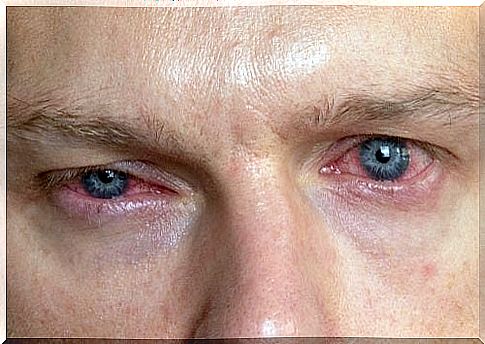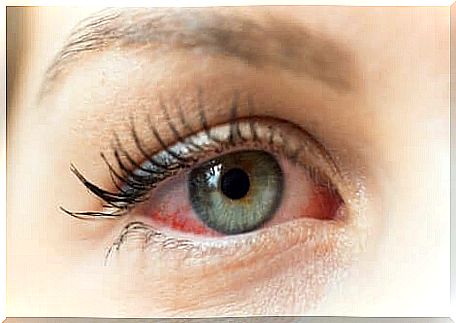Herpetic Keratitis: How To Recognize It?

Herpetic keratitis is inflammation of the cornea caused by a viral Herpes infection . The cornea is the front part of the eye, which covers the iris and pupil and, if damaged, can affect vision.
Viruses of the Herpes family are very common. The type responsible for herpetic keratitis in most cases is Herpes simplex type I. It is estimated that 90% of the population came into contact with this virus in childhood.
This virus can persist in our body in a latent form and reactivate itself when certain conditions arise, such as in the case of a lowering of the immune defenses. This means that pathologies such as herpetic keratitis are quite frequent.
This eye infection can be confused with other diseases and can be recurrent. For this, in today’s article we explain everything you need to know to recognize it.
What are the causes of herpetic keratitis?

L ‘ Herpes simplex Type I is very common and contagious and is spread by contact with skin or saliva. Typically, people come into contact with this virus in childhood, although in most cases they do not develop symptoms. It is called primary infection.
The virus remains dormant in our nervous system, skin and eyes. This means that it continues to be present in our body and can reactivate at any time.
There are many conditions under which this virus can reactivate. For example, stress, sun exposure, fever or a trauma that causes a serious lowering of defenses. The menstrual cycle in women or certain medications can also facilitate the reactivation of the Herpes virus . One of the manifestations of the reactivation of the virus is herpetic keratitis.
How does herpetic keratitis trigger?
As we have already mentioned, the virus can infect the eye in the first contact of the organism with Herpes , that is, during the primary infection. Typically, this contact occurs in childhood. However, in these cases the symptoms are mild and are often confused with a common conjunctivitis.
In most cases, however, herpetic keratitis appears following a reactivation of the virus. In this case, the latent virus, present in the eye, can cause an infection when the adult has a lowered immune defenses.
What are the symptoms of herpetic keratitis?
In the case of a primary infection, the symptoms are similar to those of a common conjunctivitis. The eye appears red and itchy. There may also be a discharge, yellowish or greenish, and lumps of mucus on the eyelids or eyelashes.
When it comes to a reactivation of the virus, however, herpetic keratitis shows much more severe symptoms. The most common symptoms are:
- Red and sore eyes.
- Foreign body sensation in the eye.
- Constant tearing.
- Sensitivity to bright light (photophobia).
If the infection becomes complicated, the cornea becomes inflamed to the point of causing blurred vision. In some cases, ulcers may even form on the cornea. The latter complication is particularly serious, because any injury to this part of the eye can cause blindness.
Also, if herpetic keratitis recurs, it can damage the surface of the cornea. These permanent scars impair vision.

How is the diagnosis made?
To diagnose herpetic keratitis. it is essential to contact your primary care or ophthalmologist as soon as symptoms appear. Your doctor will do an appropriate eye examination.
For this purpose, eye drops with temporary dye are used. In this way, it is possible to mark the lesions of the cornea, if any, and identify the damaged areas.
Sometimes, the doctor may find it necessary to take a sample of the damaged areas for examination in the laboratory. By culturing the sample, the presence of the virus in the eye can be determined.
Treatment and cure of herpetic keratitis
There is no cure for eradicating the Herpes virus from the body completely. However, there are drugs that can treat the infections caused by it, such as herpetic keratitis.
First, doctors prescribe antiviral eye drops. Depending on the severity, they may also recommend oral or intravenous antiviral administration. The most common antiviral is called acyclovir.
However, when keratitis has already produced severe lesions on the cornea, the treatment is more complex. You may even need a cornea transplant. In any case, the specialist will indicate the most appropriate treatment.
To conclude
Herpetic keratitis is a very common eye infection that if not treated properly can cause severe vision problems. For this reason, it is important to seek medical attention if you notice symptoms of this infection.









